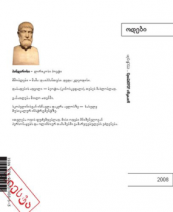THE ODES
Gaga Lomidze, Literary critic
EXTRACT
Translated into German by Julia Dengg and Ilia Gasviani
KRIEGSODE
Brief eines Soldaten aus Pschawi
Tod Nr. 2
Für L
Für R
Hier ist es jetzt ein wenig kühler,
bin fast wieder so angezogen –
hab den Hut verloren und die Waffe.
In der Tasche geblieben ist mir schweißnasses Brot.
Hier sind die Zimmer sauber und die Wände warm,
ich trinke Kaffee,
fluche nicht mehr,
rauche wenig.
Ja, so war es –
ich hab die Angst verloren,
in der unerträglichen Hitze hier ließ die Angst jeden kalt,
hab sie auch nicht gesucht –
hab die Angst dort hinten wo verloren
und stieg dann über satte Freunde,
die nach dem Essen den Schlaf
wieder liebten wie Tote ...
Ja, sechs Tage aßen wir Kugeln,
als Zutat trockene Tränen,
um die Kugeln im Hals hinunterzuschlucken ...
Die Gewohnheit macht einen nach dem Essen todmüde,
aber auch in der Nacht hasste ich den Schlaf wie die Pest,
schau, auch jetzt hielt ich es nicht aus und bin ich aufgewacht –
hier ist es jetzt ein wenig kühler,
durch das offene Fenster höre ich vorsichtige Straßengeräusche
und die Nachbarn erfinden unwillkürliche Lieder.
Hier kenn ich niemanden.
Aus diesem Fenster hab ich nur einmal geschaut,
weißt du noch, meine Höhenangst,
die Angst ist mir geblieben –
aus jenem Fenster scheinen die Wolken so weit weg,
so weit unten scheinen die Wolken,
so weit unten
und so weit weg.
Translation into English by Nino Bardzimashvili
THIRST. VILLAGE. THIRST
I’ll not say any more –
I miss you.
It’s as threadbare
as sadness
that we exchanged instead of rings
and I’m sleepy.
It is a village.
Huts still remain here
and rain too
and some smoke
(inhaling of dying fireplace)
and we stayed here,
as city
chewed us like tobacco and spat us out –
our broken words ache us on a muddy asphalt
and to come to each-other
we lean on eyes as on crutch again.
And the rain remained,
the rain – in the huts,
and there, nearby,
in the huts of spring rain –
old moon came by.
Now we are getting wet by the moon again
and I repeat:
Coming of spring bares these dry trees,
Trees stand in winter as in paradise,
Trees stand in winter as in paradise,
Coming of spring bares these dry trees,
and dry trees are shy of green eyes again
and I miss you,
I’ll tell you no more
because it’s already weird
as the ring
that we exchanged instead of thoughts
and it makes me laugh,
it makes me laugh,
because, maybe, it’s we who became weird
and yesterday,
in the end of afternoon
I was throwing night on the white coffin of your mother
and in the motley coffin of your father
hungry earthworm woke up
and stole past into the white coffin of your mother.
In case of using the information, please, indicate the source.
